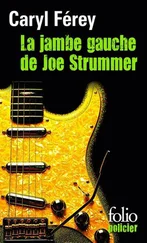
Redemption Song
The Definitive Biography of Joe Strummer
Chris Salewicz

COVER
TITLE PAGE Redemption Song The Definitive Biography of Joe Strummer Chris Salewicz
1 STRAIGHT TO HEAVEN
2 R.I.PUNK
3 INDIAN SUMMER
4 STEPPING OUT OF BABYLON (ONE MORE TIME)
5 BE TRUE TO YOUR SCHOOL (LIKE YOU WOULD TO YOUR GIRL)
6 BLUE APPLES
7 THE MAGIC VEST
8 THE BAD SHOPLIFTER GOES GRAVEDIGGING
9 PILLARS OF WISDOM
10 ‘THIS MAN IS A STAR!’
11 I’M GOING TO BE A PUNK ROCKER
12 UNDER HEAVY MANNERS
13 THE ALL-NIGHT DRUG-PROWLING WOLF
14 RED HAND OF FATE
15 NEWS OF CLOCK NINE
16 1 MAY TAKE A HOLIDAY
17 THE NEWS BEHIND THE NEWS
18 ANGER WAS COOLER
19 SPANISH BOMBS
20 MAN OF MYSTERY
21 SOLDIERS OF MISFORTUNE
22 ON THE OTHER HAND …
23 THE RECKLESS ALTERNATIVE
24 THE COOL IMPOSSIBLE
25 THE EXCITEMENT GANG
26 LET’S ROCK AGAIN!
27 CAMPFIRE TALES
28 BRINGING IT ALL BACK HOME
29 CODA (THE WEST)
EULOGY
PICTURE SECTION
INDEX
ACKNOWLEDGEMENTS
PRAISE FOR CHRIS SALEWICZ’S REDEMPTION SONG
BY THE SAME AUTHOR
ROOTS OF HEATHEN
COPYRIGHT
ABOUT THE PUBLISHER
1
STRAIGHT TO HEAVEN
2002
This is how I heard about Joe’s death: Don Letts, the Rastafarian film director who had made all the Clash videos, called me at around 9.30 on the evening of 22 December 2002.
‘I’ve got to tell you, Chris: Joe’s died – of a heart attack.’
‘Oh-fuckin’-hell-Oh-fuckin’-hell-Oh-fuckin’-hell,’ was all I could say.
I poured a large glass of rum and stuck Don’s documentary about the group, Westway to the World , on the video. I called up Mick Jones, who in between sobs was his usual funny self, telling me how glad he was he’d played with Joe at the benefit for the Fire Brigades Union five weeks before.
‘I don’t even know what religion he was,’ Mick said.
‘Some kind of Scottish low-church Presbyterian, I imagine,’ I suggested.
‘Church of Beer, probably,’ laughed Mick, tearfully.
I went to bed late, and although I hardly slept I didn’t get up until around 9.30. At around 9.55 the phone rang: ITN News. Could they interview me for the 10.00 bulletin? I sat down on the sofa and made some quick soundbite-sized notes. I’m not even sure what I said. The phone rang again: the Independent wanted me to write an obituary, a long one, 2,000 words, by 4 o’clock. I started up the computer, opening up my assorted Strummer files, pulling out quotes and phrases. Then the phone rang once more: ITN News again. Could they send a car for me to be on the 12.30 News? Call me back in a minute, I said: I need to work out whether I can do it – the obituary is what counts most. I put the phone down. Someone’s got to do this for Joe, I thought, but I don’t want to blow the obit by doing too much. I called Joe’s home in Somerset and left a message of condolence for Lucinda, his widow.
By the time the car came for me at half eleven, I’d got a good amount done. As it always does, the TV stuff took much longer than it was meant to – they wanted to record something more for the evening news. It was 2.00 p.m. before I was home again. I still had a lot to do. But somehow time stretched, giving me many more minutes an hour than I might have expected. I e-mailed the obituary through at ten minutes to four. This is what I wrote:
The job of being Joe Strummer, spokesman for the punk generation and front-man for the Clash, never sat easily with the former John Mellor. Always prepared to give of himself to his fans, he still felt a weight of responsibility on his shoulders that often made him crave anonymity, as much as the natural performer within him needed the spotlight.
But when – after a hiatus of almost a decade and a half – he returned to recording and performing with his new group the Mescaleros in 1999, it was business as usual: seemingly the same huge amounts of energy, passion and heart-on-sleeve belief that were his trademark with the Clash and that drew a worldwide audience for him and the group. After a show the dressing-room or backstage bar still would be crammed with fans and friends as Joe held forth on the issues of the day, in his preferred role of pub philosopher and articulate rabble-rouser for the dispossessed. (But even here was the endless paradox of Joe Strummer: he could argue the case for Yorkshire pitworkers or homeless Latinos in Los Angeles, but if obliged to reveal himself through any interior observation, he would generally freeze. Even other members of the Clash would complain about his hopelessness at soul-baring.)
Yet when he played a show at London’s 100 Club two years ago, he was so exhausted afterwards that he had to lie down on the floor of the dressing-room: his Mescaleros’ set included a good percentage of Clash songs, and you worried that the frenetic speed at which they were performed would test the health of a man approaching his fiftieth birthday. In an irony that Joe Strummer no doubt would have appreciated, his death last Sunday afternoon came not from the stock rock’n’roll killers of drugs, drink or travel accidents, but after taking his dog for a walk at his home in Somerset: sitting down on a chair in his kitchen, he suffered a fatal heart attack. [I later learnt it was in his living-room, and it was ‘dogs’, not ‘dog’.]
Neither of his parents had lived to a ripe old age. Joe Strummer, who earned his sobriquet from his crunchy rhythm guitar style, was born in Ankara, Turkey, in 1952 to a career diplomat. Christened John Graham Mellor, he was sent at the age of ten [nine] to a minor public school, the City of London Freemen’s School at Ashtead Park in Surrey. He had already lived in Cairo, Mexico City (‘I remember the 1956 earthquake vividly; running to hide behind a brick wall, which was the worst thing to do,’ he once told me) and Bonn. Strummer’s father’s profession of career diplomat didn’t arise from any position of privilege – quite the opposite, in fact. ‘He was a self-made man, and we could never get on,’ said Strummer. ‘He couldn’t understand why I was last in every class at school. He didn’t understand there were different shapes to every piece of wood, different grains to people. I don’t blame him, because all he knew was that he pulled himself out of it by studying really hard.’
All the same, such a background was not especially appropriate in the mid-1970s punk world of supposed working-class heroes, which may explain why Strummer always seemed even more anarchic than his contemporaries. Mick Jones, like Strummer a former art-school student, discovered Joe when he was singing with squat-rock R’n’B group The 101’ers, and poached him for a group he was forming called the Clash, becoming his songwriting partner: matched to Jones’s zeitgeist musical arrangements, Strummer’s lyrics were the words of a satirical poet, and often hilariously funny – one of his first creative contributions on linking up with Mick Jones was to change the title of a love-song called ‘I’m So Bored with You’ to ‘I’m So Bored with the USA’. Verbal non-sequiturs were a speciality: his gasped aside of ‘vacuum-cleaner sucks up budgie’ at the end of ‘Magnificent Seven’, inspired by a newspaper headline on the studio floor, is one of the funniest lines in rock’n’roll.
Читать дальше














